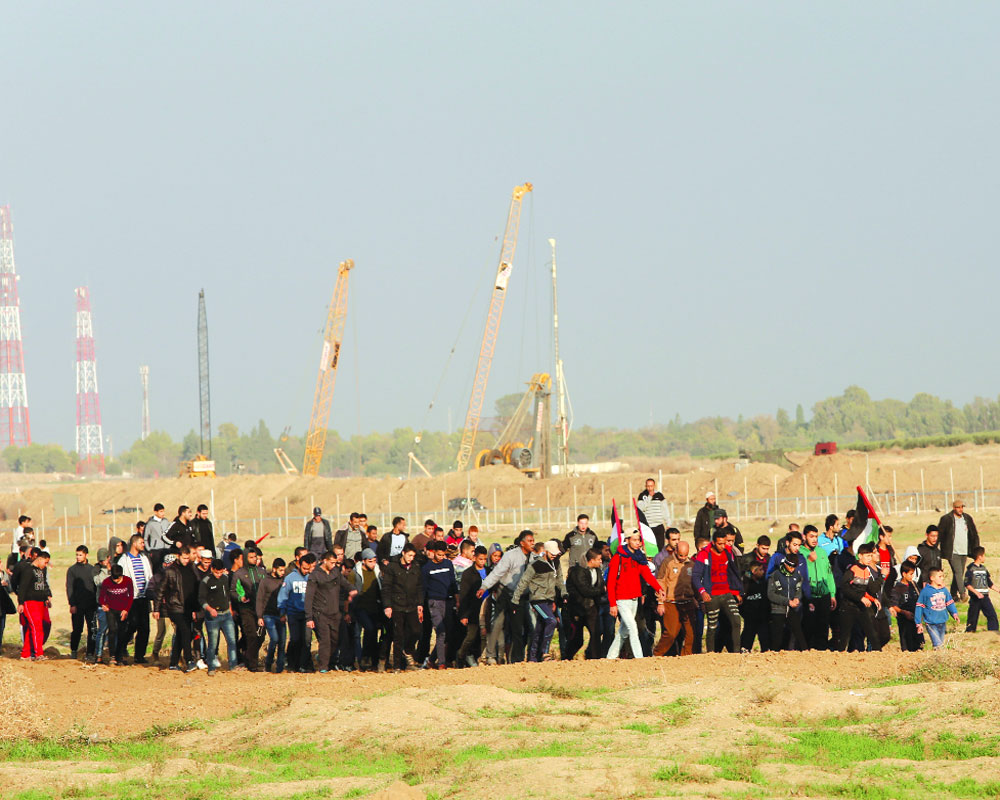It is high time both sides realised that violence is not the answer to regional peace. Only dialogues and prudence approach can provide a ray of hope for solution to the Israel-Palestinian crisis
The recent upsurge in conflict between Israeli security agencies and Palestinian organisation Hamas that has taken seven lives in Gaza Strip in last one week is a reminder of an array of issues the West Asian region has to grapple with. As many as 2,000 civilians and over 100 soldiers have died in the conflict ever since resurgence of conflict after a lull that ended in 2014.
Deeply concerned at the violent onslaught, the UN is pulling out all stops to find permanent solution to the vexing problem. But the road to peace is not that easy as the current state of affairs does not offer any hope for resuming dialogue between warring factions for ceasefire. A trial of strength is going on between the security forces of Israel and Hamas.
The present crisis is the outcome of a combination of factors, deeply interwoven in the complicated saga of the conflict in West Asia since 1948. Although on many occasions the Israeli Government had designed a series of policies aimed at quick results, Hamas took the extreme step of working against the peace proposals. However, recently a third party (Egypt supported) brokered peace and reconciliation efforts have been agreed upon by Hamas, but only time will test the sustainability of such efforts as the third party mediation has not yielded positive results in the region in the past.
In these circumstances, the solution to the biggest West Asian crisis depends on the present leadership of Israel and Hamas. However, the mounting Israeli strikes on Gaza Strip have aggravated the crisis further dashing the hopes for peace. Also, Hamas has already vowed to avenge the “Israeli slaughter” and is preparing for a fresh onslaught. Hamas has potential to strike with efficiency and its expertise has extended beyond conventional guerilla warfare.
The emboldening factors favour Hamas locally. Hamas enjoys an immense advantage because of three factors: politically, the Palestinians want Israel to withdraw from the West Bank and Gaza Strip; militarily, Hamas has sufficient arms & ammunition and well-trained fighters; and, at the local level, Hamas has been able to mobilise people ideologically.
The ongoing Israeli attacks have not only jeopardised US President George Bush-led Israeli-Palestinian Peace Accord of November 2007 but have also created serious concern among the security and military intelligence throughout the region.
The violent attacks, some of which were retaliatory, suggest that the present crisis is deeply interwoven in the issue of separate national identities and the never-ending claim over a common piece of land. Gradually, both Israel and Palestine have understood that they could only survive if a two-State solution was accepted. The Oslo Peace Accord allowed the Palestinians to build an air and sea passage in the West Bank and Gaza Strip, with then Palestinian President Yasser Arafat denouncing terrorism and the recognition of Palestine by Israeli Prime Minister Yitzhak Rabin. However, Hamas does not recognise the right of Israel as a State and its claim over territory.
There were rays of hope but nothing much came of these declarations. Earlier, Israel was keen to build around 30,000 houses for its citizens on the West Bank and Gaza Strip by 2020 but the Palestinians were vehemently against it. The Palestinians always wanted to have full control of the West Bank and almost 90 per cent withdrawal of the Israeli Army.
Palestinians always accused Israel of not abiding by the 34 commitments such as freeing of Palestinian prisoners, dismantling settlements in Jerusalem, free movement for Arabs from other countries and allowing free air and sea passage to Palestinians. The formation of the Palestinian National Authority (PNA) was a welcome step towards the restoration of peace and reconciliation in the war-torn area but the increasing number of attacks and conflict between the Fatah and Hamas members compelled Palestinian Authority President Mahmoud Abbas to dissolve the Unity Government and allow Hamas to take control of the Gaza Strip.
The existence of two separate Governments in West Bank and the Gaza Strip has created many complications for the peace process. Soon after, in June 2007, Hamas members tried to dismantle the Fatah authority in Gaza. The very idea of control over the Gaza Strip did not go down well with Israel and the US. Ever since the victory of Hamas in the Palestinian parliamentary elections in January 2006, Israel has made all efforts to isolate it.
(Author is Chandigarh-based Professor of Political Science and an expert on strategic affairs)


























